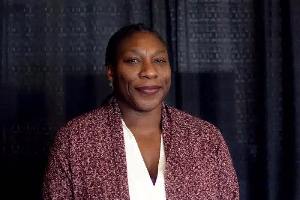Business News of Thursday, 20 November 2025
Source: www.nationsonlineng.net
Ireland, Nigeria seek stronger investment partnerships
Ireland has expressed renewed interest in partnering with Nigeria to strengthen cultural exchange, revive local textile industries and support small-scale manufacturing.
This came the President of the Police Wives’ Association (POWA), Dr. Mrs Elizabeth Egbetokun and other stakeholders at the First Made-in-Nigeria Textile (MiNT) Summit in Abuja urged the Federal Government to adopt practical measures to rebuild the country’s struggling textile sector.
Irish Ambassador to Nigeria, Peter Ryan, said Ireland sees significant promise in Nigeria’s cultural and creative industries and is eager to work with the government, communities, and businesses to preserve Nigeria’s indigenous textile heritage.
He said both countries share a deep cultural identity shaped by history and expressed through fabric traditions.
Ryan said Ireland’s experience in protecting its cultural assets offers relevant lessons. “We managed to protect our culture, our language, our textiles and our way of life through almost a thousand years of colonial rule.
“We found a way to honour those traditions and integrate them into the modern world. That is why Irish textiles are in New York, Tokyo, Korea and Singapore today,” he said.
He stressed that Ireland seeks partnership, not competition, saying, “There is only one place in the world to make authentic Nigerian textiles, and only one place to make authentic Irish textiles. This is an area for cooperation.”
According to him, Ireland’s home-based weaving traditions have become global cultural exports, and Nigeria can achieve the same by protecting local designs, reviving value chains and strengthening community-based fabric technologies.
He added that the Nigerian diaspora in Ireland is already creating design collaborations that combine Irish and Nigerian influences.
“We should think about Made in Nigeria every day, not just once a year. Anything that strengthens this ecosystem will help young people and honour the traditions gifted to us by our ancestors,” Ryan said, reaffirming Ireland’s readiness to develop structured partnerships built on trust, adding that the delegation at the summit would observe, understand and identify areas where Ireland can contribute.
POWA President Egbetokun, who was honoured for her contributions to the promotion of Nigerian arts and culture, called for renewed commitment to revitalising the industry to ensure the survival and continued relevance of Nigerian textiles.
She said the summit offered a window to stimulate national reflection on the future of the textile sector.
Organisers of the MiNT festival warned that Nigeria risks losing critical cultural and economic assets if indigenous fabric technologies continue to disappear.
Dr Lizzie Ben-Iheanacho, a member of the Central Working Committee of MiNT, said the festival aims to address the rapid disappearance of traditional production knowledge. According to her, Nigeria is losing not only cultural symbols but also intellectual property.
“The fading heritage of producing Nigerian fabrics is a major concern. Generations have lost certain knowledge handed down by our ancestors.”
Ben-Iheanacho said that when indigenous textile technology dies, foreign producers replicate local designs for commercial gain, leaving communities without economic benefit or recognition.
“When that technology dies or is bastardised by outsiders, we lose the commercial rights over it,” she said.
She urged the Federal Government to adopt practical measures, including mandating indigenous fabrics for school uniforms across states.
“If every child in a government school uses two uniforms produced locally, communities will immediately see value in Made-in-Nigeria fabrics,” she said.
She cited examples from Burkina Faso and Ghana, where government policies drove local textile adoption, and pointed to Ogun State’s initiative promoting Adire as evidence that state-led action can transform the sector.
ChukwuEmeka Okereafor, Director of Programmes and Communication for MiNT, said the summit aims to renew national consciousness about the textile industry.
He recalled that Nigeria once had a thriving sector supported by cotton farmers in the North, adding, “Fabrics and fashion are important parts of the identity of a people. We can’t let that die”.
Okereafor said rebuilding the industry requires investment across the entire value chain—from cotton production to processing, design and distribution.
He warned that reliance on import-driven revenue continues to undermine local industries, stressing, “You celebrate revenue from importation, whereas indigenous products are the ones suffering.”
Other stakeholders at the festival traced the collapse of the textile sector to inconsistent policy direction, smuggling, low tariffs and the influx of cheap polyester fabrics that imitate local designs.
The challenges, they said, weakened demand for cotton and forced many mills in Kaduna, Kano and other northern states to shut down.
They called on the Federal Government to strengthen border controls, protect local manufacturers, expand support for cotton farmers, offer incentives to surviving mills and develop a coordinated revival strategy involving industry associations.
The participants said revitalising Nigeria’s textile sector would stimulate rural economies, reduce unemployment, strengthen cultural pride and open new export opportunities.
They also urged deeper Nigeria-Ireland cooperation in skills training, cultural exchange, design innovation and investment promotion, noting that Ireland’s centuries-old weaving tradition offers a model for sustainable heritage-based industry revival.
The festival featured an exhibition of Nigerian textiles and the presentation of awards to deserving individuals, including POWA President Mrs. Egbetokun and the Irish Ambassador to Nigeria, Peter Ryan.












